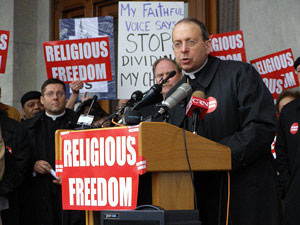 Bishop Lori speaks at the rally in Connecticut Bishop Lori speaks at the rally in Connecticut |
State Senator John McKinney and State Representative Michael P. Lawlor recently acted in violation of the First Amendment of the United States Constitution in a stumbling attempt to undermine Church authority. Senator McKinney and Representative Lawlor are both members of the General Assembly’s judiciary committee of Connecticut.
The introduction of Bill 1098 would have taken away the privileges given to us by the First Amendment that safeguard religious freedom. It would have removed pastors and bishops from their administrative positions in Church matters in the state of Connecticut and the State would take their place as direct administrators of the Catholic Church. This unprecedented and unconstitutional proposal would have put the Catholic Church back more than a century and reduced the authority of the bishops and priests (over their own Church) to practically nothing.
The New York Times stated that: "Bishop William E. Lori of the Bridgeport Diocese called it (Bill 1098) payback for the bishops’ opposition to gay marriage." Seeing that these two representatives from the judiciary committee are openly gay and as such would be in opposition to the Catholic Church’s position on gay marriage, we have to agree that Bishop Lori has a valid point.
Attorney Philip Lacovara sent a letter to the members of the judiciary committee saying just how unconstitutional this bill was:
"One of the key doctrines embodied in this protection of religious liberty is that the State has no legitimate power to intrude into the internal affairs of a hierarchical church. That is, the guarantee of religious liberty applies not only to the private beliefs of individuals; it also protects the autonomy of organized churches as such. That principle has been established for two centuries. The so-called ‘internal affairs’ doctrine means that the leaders of a hierarchical church have the final and absolute authority to decide how the church will be organized and governed, and no State may override that autonomy by purporting to require that the church be reorganized in some other way simply because a public official may think that a different organization is ‘better’ for the members of the congregation."
After overwhelming opposition from the Catholic population in Connecticut (who also represent a large majority of voters), the bill was shelved indefinitely. The chagrin of these two judiciary committee members is complete. Why they imagined that a bill of this nature would ever be passed is totally incomprehensible, however it does give a strong testimony of the vigour and determination of Catholics in the state of Connecticut. State officials and members of the judiciary committee will perhaps think a little more clearly before attempting to meddle in matters of Catholic morality in the future.
Catherine Duchesne
 In this special issue of the journal, MICHAEL, the reader will discover who are the true rulers of the world. We discuss that the current monetary system is a mechanism to control populations. The reader will come to understand that "crises" are created and that when governments attempt to get out of the grip of financial tyranny wars are waged.
In this special issue of the journal, MICHAEL, the reader will discover who are the true rulers of the world. We discuss that the current monetary system is a mechanism to control populations. The reader will come to understand that "crises" are created and that when governments attempt to get out of the grip of financial tyranny wars are waged. An Efficient Financial System, written by Louis Even, is for the reader who has some understanding of the Douglas Social Credit monetary reform principles. Technical aspects and applications are discussed in short chapters dedicated to the three propositions, how equilibrium between prices and purchasing power can be achieved, the financing of private and public production, how a Social Dividend would be financed, and, finally, what would become of taxes under a Douglas Social Credit economy. Study this publication to better grasp the practical application of Douglas' work.
An Efficient Financial System, written by Louis Even, is for the reader who has some understanding of the Douglas Social Credit monetary reform principles. Technical aspects and applications are discussed in short chapters dedicated to the three propositions, how equilibrium between prices and purchasing power can be achieved, the financing of private and public production, how a Social Dividend would be financed, and, finally, what would become of taxes under a Douglas Social Credit economy. Study this publication to better grasp the practical application of Douglas' work.  Reflections of African bishops and priests after our weeks of study in Rougemont, Canada, on Economic Democracy, 2008-2018
Reflections of African bishops and priests after our weeks of study in Rougemont, Canada, on Economic Democracy, 2008-2018 The Social Dividend is one of three principles that comprise the Social Credit monetary reform which is the topic of this booklet. The Social Dividend is an income granted to each citizen from cradle to grave, with- out condition, regardless of employment status.
The Social Dividend is one of three principles that comprise the Social Credit monetary reform which is the topic of this booklet. The Social Dividend is an income granted to each citizen from cradle to grave, with- out condition, regardless of employment status.Rougemont Quebec Monthly Meetings
Every 4th Sunday of every month, a monthly meeting is held in Rougemont.